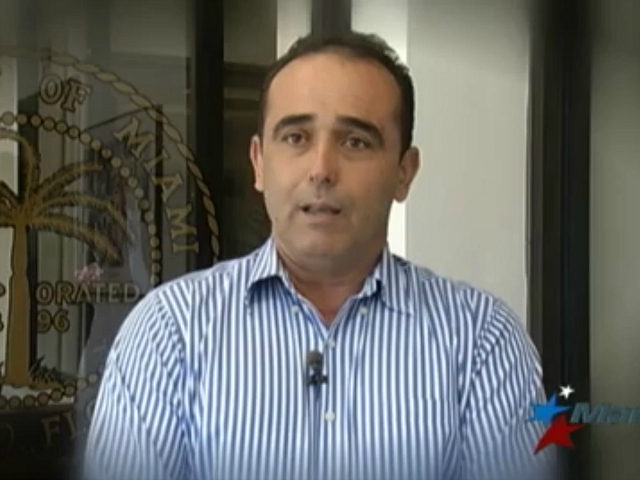Eduardo Cardet, the head of Cuba’s anti-communist Christian Liberation Movement (MCL), has been sentenced to serve three years in prison following his violent arrest in front of his two young children after the death of Fidel Castro in November.
Some witnesses say Cardet had been heard criticizing the government for forcing Cubans to sign overwrought goodbye notes in government-issued “condolence books.” The Cuban government imposed a nine-day “mourning period” following the elder Castro’s death in late November 2016, imprisoning those who dared defy it.
On Tuesday, Cuban courts convicted Cardet of assault against an officer of the state, a crime his family who witnessed his arrest, say he did not commit. “The sentence is based on manipulated data, without taking into consideration the testimony of defense witnesses,” Cardet’s wife, Yaimaris Vecino, said in a statement published by the MCL. “As we imagined, this has been another attempt to detain him as long as possible.” His family, she says, will appeal the sentence.
Vecino witnessed her husband’s arrest. Cuban police apprehended and beat him, she says, while she held her children away from the scene. Police hauled Cardet away and have since denied him bail on three occasions.
Amnesty International has declared Cardet a prisoner of conscience. “Doctor Cardet is confined to an Holguín prison just for having criticized Fidel Castro,” a statement released Wednesday by the NGO read. Cardet is a medical doctor by trade. “Dr. Cardet is a prisoner of conscience who should be freed immediately.” Amnesty declared Cardet a prisoner of conscience in February.
During his stay in prison, the 47-year-old Cardet has suffered from significant health ailments, particularly a violent bout with asthma. Vecino told the Miami-based outlet Martí Noticias that he had developed a respiratory infection in prison and had begun to develop a severe cough.
Cardet is far from the first to see his health deteriorate in the brutal conditions of Cuban prisons. The Cuban artist Danilo Maldonado Machado, known by his artistic name “El Sexto,” also told reporters and human rights NGOs that he had suffered acute asthma attacks while in prison. Maldonado was arrested the same week as Cardet for actively celebrating Fidel Castro’s death on the streets of Havana in a Facebook Live video. Unlike Cardet, an international campaign to free Maldonado was successful, and he is currently on a human rights advocacy tour abroad.
Earlier this month, another Cuban dissident, Hamell Santiago Maz Hernández, died under mysterious circumstances in a Cuban prison. He had not been convicted but had served eight months in prison await trial on charges of “disrepect” of the Communist government, a crime in Cuba. Cuban officials told Maz’s family that he had died of “cardiac arrest,” but fellow members of the dissident group Patriotic Union of Cuba (UNPACU) rejected the official explanation. Many UNPACU members behind bars demanded guarantees for their safety following the incident.
Cardet’s was among the over 10,000 politically-motivated arrests committed in Cuba in 2016, according to the Cuban Commission for Human Rights and National Reconciliation (CCDHRN), an NGO that tracks political oppression in Cuba.
Cuban police committed nearly 2,000 more such arrests in 2015 than 2016, the year in which President Barack Obama made his historic visit to the island. Many of the victims of these arrests are members of the Ladies in White dissident group, who attend Catholic Mass carrying the photos of political prisoners as an act of protest. The same women are often arrested on a weekly basis after beatings and humiliating verbal assault.
Cardet took over the MCL following the death of its founder, Oswaldo Payá, in 2012. Payá died in a car accident under mysterious circumstances, and many Cuban dissidents believe that the government acts to cause the crash and kill him. Payá and his MCL are demanding free and fair elections and a transition out of communism and into democratic rule for Cuba.

COMMENTS
Please let us know if you're having issues with commenting.